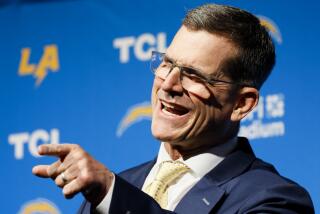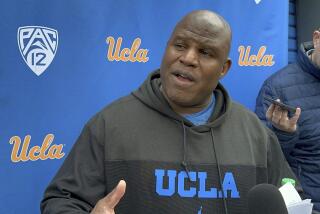Parcells Takes Aim at Easy Target--the Media
If we’re going to bear the blame, then we have to get some of the credit. It’s only fair. Bill Parcells ought to acknowledge as much.
The New York Giants beat the Dallas Cowboys, 29-21, Sunday and played their best game of the season, too. And it was because of the press, those ink-stained wretches, those nattering nabobs of negativism. Us.
It was because the coach told his players they could do it no matter what the press said.
He applied the “P-Curse.” That’s like Mike Dukakis being given the “L-Curse” in the election campaign.
The press reports what it sees, what it’s told and what it understands to be true. The coach wants the press to report what he thinks is most useful to him.
Football teams, almost by definition, are strong to the right. And the press -- well -- you know the press’ history.
Parcells’ Giants had somehow managed to win enough games to be in first place in the NFC East. How they won some of the games defied explanation. In Parcells’ view, objectively reporting that was glaring negativism.
In the week before the Giants played Dallas, Parcells said his biggest job was “to not allow them to think they are as bad as everybody says they are.” Every day, he said, he had media “guys coming in and telling my players that they’re 20-something in the league in defense, and they give up too many big plays and they give up too many sacks, and that we got a running game that ain’t worth ... And if I don’t correct that impression, pretty soon my guys start to believe it.”
Well, if the newsprint fits, wear it.
If the coach circled the wagons, he could make the press the enemy, and the players would never have to see the facts. The press rarely is pleased by adversity and almost never causes it. But it is generally useful to develop an us-against-them mentality within the team.
Parcells advised his players not to read the papers. “He told us the press is our enemy,” one player said. He told them, according to another player, the newspeople were “insidious communist ... “
The player also said Parcells called the press “submersives,” which may have been a slip of either the tongue or the ear. At face value, it means the people covering the team look under the surface.
But if the coach can make his players sufficiently mad at something, maybe they’ll play with that sought after fury. Two years ago Parcells showed his players what he said was a story quoting Philadelphia Eagles Coach Buddy Ryan saying the Giants couldn’t beat Columbia. What an insult!
Ryan never said such a thing and there had been no such story. But the bulletin board excites some players.
This week Parcells denied everything, showing his best toothy smile and guileless expression. “I never said that,” he said.
Would the coach ever use press-bashing as a motivational tool?
“I’d never do that,” he said.
Parcells’ manner said he had been kidding all along. It smelled more of kidding on the square. That way the coach could have it both ways -- he could have the players rallied against a common foe and the kind indulgenceof the press.
Don’t give Parcells too much credit; he didn’t invent the tactic. He isn’t even the foremost practitioner. George Steinbrenner is a master at using the press. John Thompson took his us-against-them approach all the way to the Olympics.
Football players are most susceptible to being manipulated and football coaches are most eager to use the press as the enemy.
When Walt Michaels’ Jets lost their first three games one season when much better was expected, he summoned a reporter and detailed the failings of several players. He said things that only the coach knew, but he insisted he not be identified as the source. He wanted the press to build a fire.
Mostly, Micheals was wary of the press, as is current Jets Coach Joe Walton. Former Giants coach Bill Arnsparger always made it clear: “The press is the enemy.” Ray Perkins didn’t have to put it into words; his glare at a questioner burned it through to the locker room.
“Everyone -- the press -- doesn’t have the best interest of the team at heart, nor should they,” said Joe Fields, who is with the Giants after 13 years with the Jets. He is a perceptive man.
Players who come to the pros from football programs at Ohio State or Oklahoma have rarely seen a critical comment. It is shocking for them to deal with the scrutiny. “A young guy from Oklahoma who has never talked to a reporter can get himself twisted,” Fields said. “Maybe he doesn’t understand what he’s saying, especially to a reporter with New York savvy. I never said anything that could be interpreted in a way I didn’t want.”
During the football season, Fields said he reads transactions, injury lists and statistics, but never stories. “I know what’s going on in the locker room,” he said. “I don’t want to read what may be going on -- or may not be.”
But regarding the Yankees, he said, “I read the most sensational headlines. I’ll read about Mattingly and Steinbrenner. I believe most of it is true.”
The most common complaint the athlete makes about the people who cover the team is, “What do they know? They never played the game.”
A few years ago one Giant was making that point, and “especially that guy over there.” That guy happened to be Augie Lio, who covered the Giants for the Passaic Herald-News.
Lio is a member of the College Football Hall of Fame. He played seven years in the National Football League.
More to Read
Go beyond the scoreboard
Get the latest on L.A.'s teams in the daily Sports Report newsletter.
You may occasionally receive promotional content from the Los Angeles Times.










